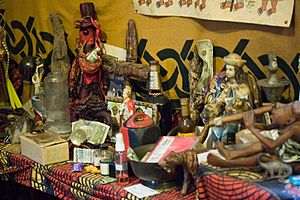African diaspora religions facts for kids
African diaspora religions are a group of related beliefs. They grew in the Americas, including the Caribbean, Latin America, and the Southern United States. These religions come from traditional African religions. They also have some ideas from Christianity and Islam.
Contents
What are they like?
These religions often involve honoring ancestors. They believe in a main creator deity (a god who made the world). They also have many other spirits, like the Orisha, Loa, Vodun, Nkisi, and Alusi.
Many of these religions mix different traditions. This is called religious syncretism. They combine African beliefs with parts of Folk Catholicism. This can include folk saints and other local religious customs. Some also use ideas from Native American religion, Spiritism, and European folklore.
There are also spiritual practices focused on health. These include traditions like Obeah and Hoodoo. African religions in the Americas can be very different. Some have only a few African roots. Others, like Trinidad Orisha, are almost completely African.
African religions today
The way African people moved around has changed a lot over time. At first, many Africans were forced to move as captives. Later, some free and skilled Africans chose to move to new places. They looked for safety or better jobs.
In the past, people in the diaspora had little contact with Africa. Now, many keep in touch with their home continent. This has led to a unique African identity. These people connect different continents, worlds, and cultures.
List of religions and spiritual traditions
Brazil
- Batuque
- Candomblé
- Candomblé Bantu
- Candomblé Jejé
- Candomblé Ketu
- Catimbó
- Macumba
- Quimbanda
- Santo Daime
- Tambor de Mina
- Umbanda
- Xangô de Recife
Belize
- Dugu Obeah
Colombia
- Colombian Yuyu
- Lumbalú [1]
Cuba
- Abakuá
- Arará religion
- Cuban Vodú
- Palo
- Santería
Curaçao
- Montamentu
Dominican Republic
- Dominican Vudú
Grenada
- Big Drum Dance (Gwa Tambu)
Guatemala (Garifuna)
- Dugu
Guyana
- Comfa
- Obeah
Haiti
- Haitian Vodou
Honduras
- Dugu
Nicaragua
- Dugu
Jamaica
- Convince
- Jamaican Maroon religion
- Kromanti dance
- Kumina
- Myal
- Obeah
- Rastafari
- Bobo Ashanti
- Nyabinghi
- Twelve Tribes of Israel
Puerto Rico
- Sansé Espiritismo
Saint Lucia
- Kélé
- Obeah
Suriname
The Bahamas
- Obeah
- Haitian Vodou
- Rastafari
Trinidad and Tobago
- Spiritual Baptist
- Trinidad Orisha
- Obeah
- Rastafari
- Vodunu
United States
- Hoodoo (a set of traditions)
- Louisiana Voodoo
Venezuela
- María Lionza
- Venezuelan Yuyu
See also
 In Spanish: Religiones afroamericanas para niños
In Spanish: Religiones afroamericanas para niños
- Black theology
- Ring shout
- Traditional African religions
 | Anna J. Cooper |
 | Mary McLeod Bethune |
 | Lillie Mae Bradford |


